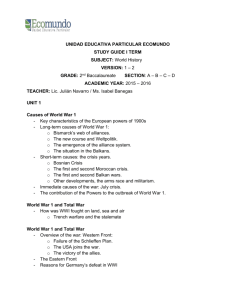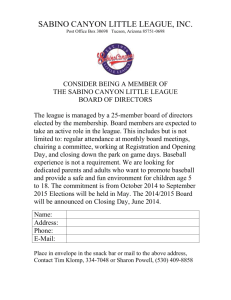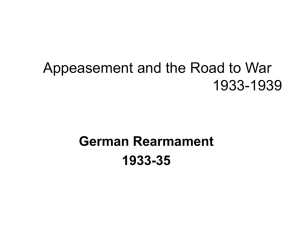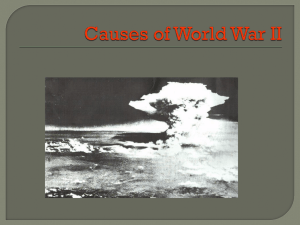Why did international diplomacy fail to prevent the outbreak in 1939
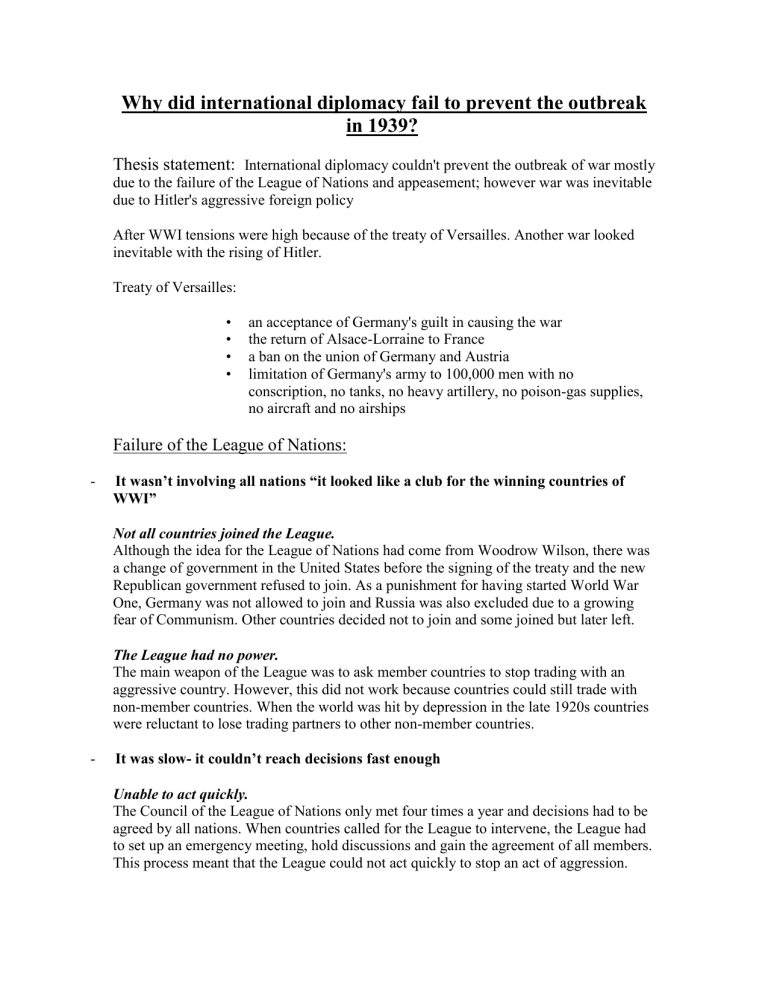
Why did international diplomacy fail to prevent the outbreak in 1939?
Thesis statement:
International diplomacy couldn't prevent the outbreak of war mostly due to the failure of the League of Nations and appeasement; however war was inevitable due to Hitler's aggressive foreign policy
After WWI tensions were high because of the treaty of Versailles. Another war looked inevitable with the rising of Hitler.
Treaty of Versailles:
• an acceptance of Germany's guilt in causing the war
• the return of Alsace-Lorraine to France
• a ban on the union of Germany and Austria
• limitation of Germany's army to 100,000 men with no conscription, no tanks, no heavy artillery, no poison-gas supplies, no aircraft and no airships
Failure of the League of Nations:
It wasn’t involving all nations “it looked like a club for the winning countries of
WWI”
Not all countries joined the League.
Although the idea for the League of Nations had come from Woodrow Wilson, there was a change of government in the United States before the signing of the treaty and the new
Republican government refused to join. As a punishment for having started World War
One, Germany was not allowed to join and Russia was also excluded due to a growing fear of Communism. Other countries decided not to join and some joined but later left.
The League had no power.
The main weapon of the League was to ask member countries to stop trading with an aggressive country. However, this did not work because countries could still trade with non-member countries. When the world was hit by depression in the late 1920s countries were reluctant to lose trading partners to other non-member countries.
It was slow- it couldn’t reach decisions fast enough
Unable to act quickly.
The Council of the League of Nations only met four times a year and decisions had to be agreed by all nations. When countries called for the League to intervene, the League had to set up an emergency meeting, hold discussions and gain the agreement of all members.
This process meant that the League could not act quickly to stop an act of aggression.
The Manchurian Crisis 1931
First real test of the League of Nation’s principle of collective security
League should have placed economic and military sanctions upon Japan as the aggressive member state.
The problem was that the League was seriously weakened by the non-membership of the
USA and Russia.
In effect the League was comprised of only two Great Powers, Britain and France. Any act of collective security would call for the leadership of Britain and France, but this was virtually impossible as both countries were in depression.
The result was that Japan was appeased and got away with adding Manchuria (later called
Manchukuo ) to its empire
The Abyssinian Crisis 1935
Mussolini demanded extensive territories in Abyssinia. Emperor Haile Selassie of
Abyssinia appealed to the League of Nations for help
Italy invaded Abyssinia and all eyes turned to the British, as a leading member of the
League, to make good their promises of punishing Italy
Britain had no intention of going to war with Italy over Abyssinia; after all they could hardly prevent Italy’s aggression in Abyssinia
Mussolini completed the conquest of Abyssinia despite Britain and the League, but most seriously Mussolini began to lean towards an alliance with Hitler
Failure of League of Nations and of the Appeasement:
No US support
Woodrow Wilson, had dreamt up the idea of the League - America - refused to join it. As
America was the world’s most powerful nation, this was a serious blow to the prestige of the League. However, America’s refusal to join the League, fitted in with her desire to have an isolationist policy throughout the world.
Fear of upsetting powerful nations (league = Italy)
Couldn’t provide a military capable of stopping aggression
The League had no army.
Soldiers were to be supplied by member countries. However, countries were reluctant to
get involved and risk provoking an aggressive country into taking direct action against them and failed to provide troops.
Failure of the Appeasement
• As a result of appeasement, Hitler’s confidence grew significantly
–
The Anglo-German Naval Agreement signed in June 1935 was Britain’s form of appeasement towards the German rearmaments.
•
The terms of the agreement: German rearmament of her Navy limited to thirty-five percent of the British fleet.
• First time where the British openly approved a German contravention of the Versailles Settlement
Hitler’s foreign policy was bound to cause war:
1933 Germany left the League of Nations.
1934 Attempted Nazi coup in Austria crushed.
Poland and Germany sign alliance.
- This caused a surprise in Europe at the time. The alliance broke Germany’s diplomatic isolation while also weakening France’s series of anti-German alliances in Eastern
Europe. For the next five years Poland and Germany were to enjoy cordial relations.
However like many of his agreements, this was a tactical move and Hitler had no intention of honouring the agreement in the long term.
1935 Germany broke the military clauses of the Treaty of Versailles
1936 sent troops in the Rhineland. German army was not very strong and could have been easily defeated. Yet neither France nor Britain was prepared to start another war.
- Hitler's next step was to begin taking back the land that had been taken away from
Germany. In March 1938, German troops marched into Austria. The Austrian leader was forced to hold a vote asking the people whether they wanted to be part of
Germany.
- The results of the vote were fixed and showed that 99% of Austrian people wanted
Anschluss (union with Germany). The Austrian leader asked Britain, France and Italy for aid. Hitler promised that Anschluss was the end of his expansionist aims and not wanting to risk war, the other countries did nothing.
Hitler did not keep his word and six months later demanded that the Sudetenland region of Czechoslovakia be handed over to Germany.
- Neville Chamberlain, Prime Minister of Britain, met with Hitler three times during
September 1938 to try to reach an agreement that would prevent war. The Munich
Agreement stated that Hitler could have the Sudetenland region of Czechoslovakia provided that he promised not to invade the rest of Czechoslovakia.
- Hitler was not a man of his word and in March 1939 invaded the rest of
Czechoslovakia. Despite calls for help from the Czechoslovak government, neither
Britain nor France was prepared to take military action against Hitler. However, some action was now necessary and believing that Poland would be Hitler's next target, both
Britain and France promised that they would take military action against Hitler if he invaded Poland. Chamberlain believed that, faced with the prospect of war against
Britain and France, Hitler would stop his aggression. Chamberlain was wrong.
German troops invaded Poland on 1st September 1939.
